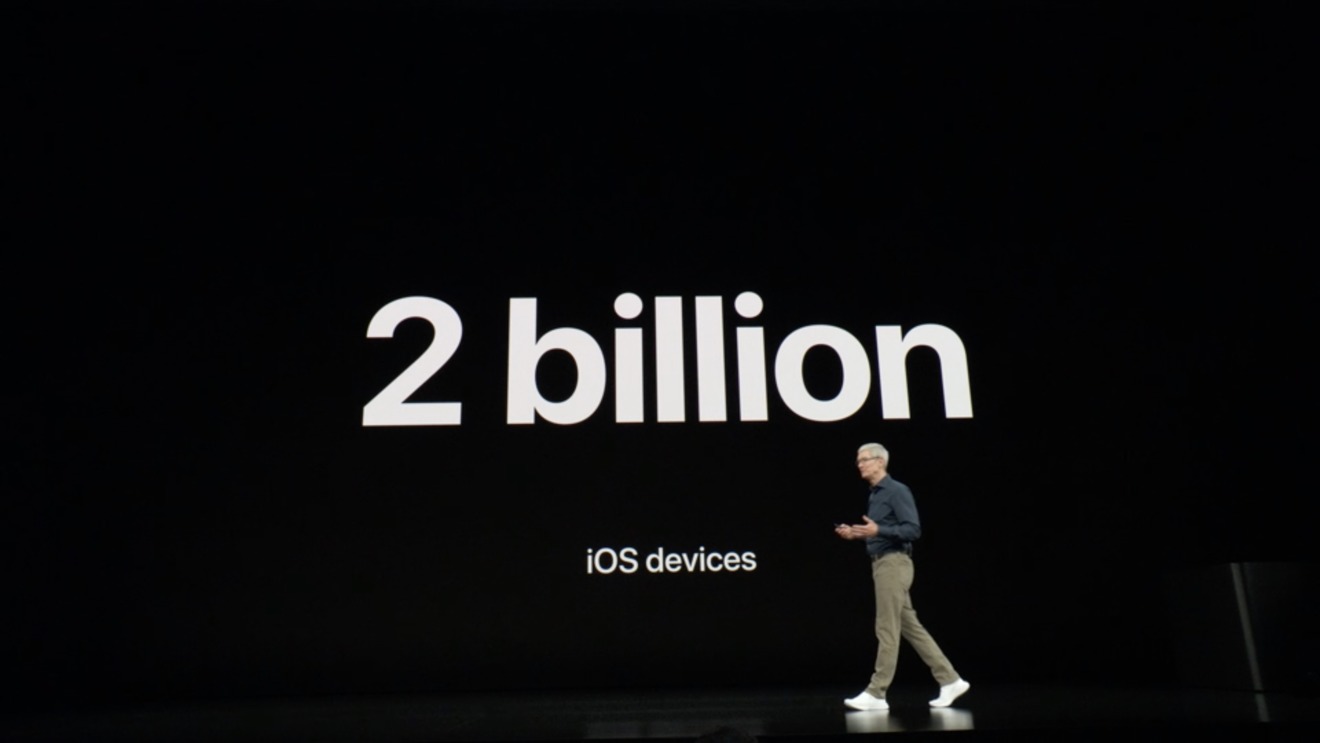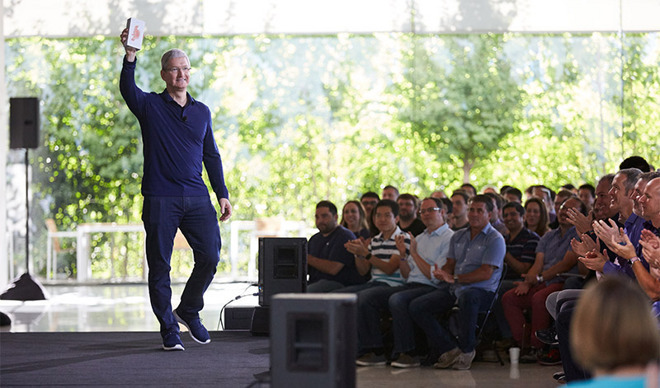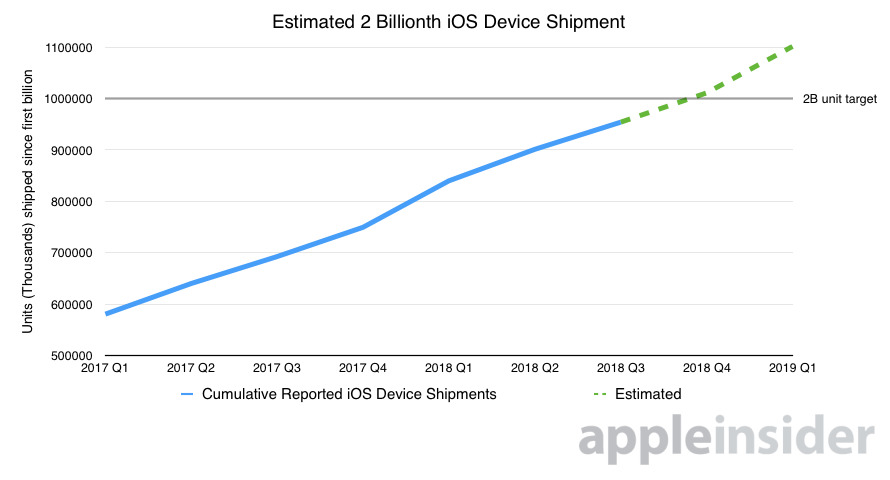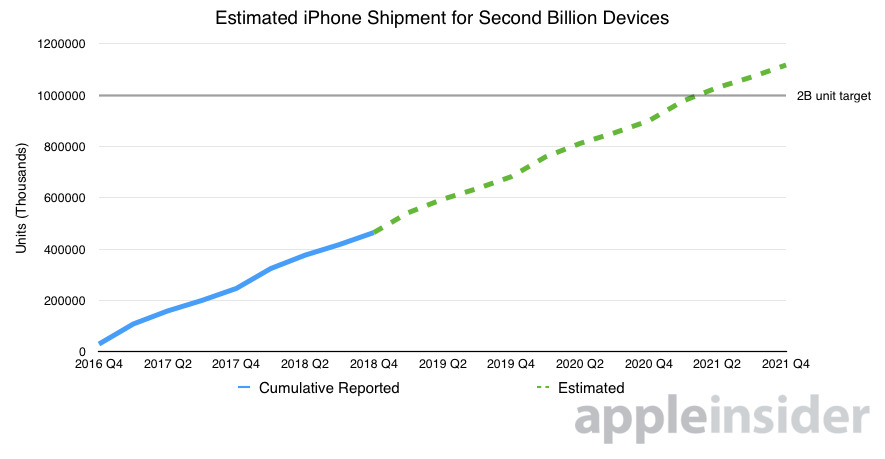At the start of Apple's "Gather Round" iPhone XS launch event on Wednesday, CEO Tim Cook took to the stage and advised the company was close to shipping its 2 billionth iOS device. AppleInsider checks the numbers to see how close that goal is, and how far away the iPhone is from reaching the same milestone.
Close to the start of the event, Cook highlighted the achievements of the company, including how Apple Stores welcome over 500 million visitors per year, but one statement caught our eye: "We are about to ship our 2 billionth iOS device." While it wasn't advised when it could take place, the typically high volume of holiday sales should mean it will take place sometime before the end of the year.
Considering the milestone achievement, it is worth crunching the numbers and examining how Apple has arrived so close to the 2 billion iOS device landmark.
Some caveats
Unfortunately, there is some ambiguity in working out how many devices Apple has sold, and when, due to the way Apple reveals its shipments. While it does advise how many iPhones and iPads it ships each quarter, the figure is to the nearest thousand units, and doesn't take into account the iPod touch, a third iOS device that doesn't have its sales figures broken out.
The second problem raised relates to data compiled by AppleInsider from the quarterly results. Our data is compiled from quarterly results going as far back as the first quarter of 2012, which means we lack detail for the first roughly 350 million units or so shipped since launch.
Since we know this is a slow sales period at the start of the iPhone's existence, it's not too much of a problem, as we are more interested in how the data appears for the second billion.
Total iOS devices
Apple revealed it sold its one billionth iOS device in the December quarter of 2014, specifically on November 22. For reference, Cook advised at the time it was a Space Gray 64GB iPhone 6 Plus, which the company retained for itself.
While we know when in the quarter the device was sold, we don't really know how many devices were sold before or after it during the quarter, so there isn't an exact amount to use for "post-billionth" shipments to start from. Add in the increase in holiday sales towards the end of the quarter, and it becomes too difficult to reliably work out.
The next best thing is to work out how far from the end of the quarter the iPhone in question was sold, and use that proportion of iPhones as a starting point.
We know the quarter ran from September 28 until December 27, a total of 91 days, and November 22 was day 52, which means there were 39 days remaining in the quarter that were post-billionth devices. For our purposes, we are counting that as 43 percent of the overall shipments for the quarter, equating to 41.2 million devices out of the 95.8 million reported for the quarter.
From the point when Apple produced its billionth iOS device until the third quarter of 2018, which ended June 30, Apple has shipped an estimated total of 954 million iPhones and iPads.
As Cook has confirmed the company is close to hitting 2 billion, it then becomes a question of whether or not it will do so this quarter, which we won't know the shipment figures for until they are announced in October.
Seeing as shipments are seasonal and have been relatively predictable for the last few years, one way to guess is to use the most recent similar quarter's data as a stand-in. In this case, we will use Q4 2017, which saw 57 million iOS device shipments, which would put the total post-billionth-device shipments to over 1.01 billion by the end of the quarter, at the end of September.
If Q4 2018's shipments are anywhere near Q4 2017's figures, you could probably expect Tim Cook to announce during the quarterly results call in October that the two billionth device shipped towards the end of September. Of course, this depend on shipments remaining static, and that the estimated post-billionth portion of the Q1 2015 quarter is anywhere close to reality.
The 2 billionth iPhone
The iPhone makes up the vast majority of device shipments in the total, outselling the iPad by 4.9 to 1 based on an average of the last four quarters. Since we've worked out how long it takes for iOS devices to reach 2 billion, it isn't that much of a stretch to guess how long it will take for iPhones to do the same.
We can use a similar calculation, this time just using iPhone data Apple provides, as well as a different timeframe. In this case, Cook advised during an employee meeting on July 27, 2016 that the 1 billionth iPhone was sold sometime in the previous week.
Since we know that the third quarter results for that year ended on June 25, we can approximate the position of the iPhone in question to be around a quarter to a third of the way through the fourth quarter for the year, as we are talking about it happening sometime during a week, not a specific day. For argument's sake, we will use two thirds of the quarter's sales in our calculations, approximately 30 million units in the period.
From that point of the billionth iPhone until the end of Q3 2018, Apple has shipped 417.9 million iPhones. Given typical iPhone sales for the fourth quarter, Apple will be at around 465 million units, and will have passed the 1.5 billion units milestone by the first quarter of 2019.
To estimate when the 2 billionth iPhone will ship, we have to make an educated guess for the fortunes of the iPhone in the coming years. There are so many factors that could affect how well the iPhone will perform in the future, that it is impossible to say if Apple's iPhone sales will grow, contract, or stay the same long-term.
These factors range from changes in consumer tastes to the popularity of devices produced by other companies, to legal issues that could affect shipments, currency fluctuations that affect prices, to how Apple innovates its future iPhone releases. Practically anything can affect future iPhone sales.
For the purposes of speculation, we will conservatively assume that Apple maintains exactly the same sales it has reported in the last four quarters, for the foreseeable future. From Q4 2017 to Q3 2018, Apple saw a total of 217.5 million iPhones.
Using this estimate, Apple should reach a total of 1,682 million shipments by the end of the 2019 financial year, and 1,900 million shipments total by the end of the 2020 financial year. By this rough calculation, this would put a celebration of the 2 billionth iPhone somewhere in the middle of 2021.
Of course, this is only a guess. If Apple sees improvements in iPhone sales, as is likely, this will bring the time of the 2 billionth iPhone much earlier, and vice versa.
It is ultimately up to consumers and market forces to determine when exactly it will occur.
 Malcolm Owen
Malcolm Owen











-m.jpg)






 Christine McKee
Christine McKee

 Marko Zivkovic
Marko Zivkovic

 Andrew Orr
Andrew Orr
 Andrew O'Hara
Andrew O'Hara
 William Gallagher
William Gallagher



-m.jpg)



8 Comments
"
I pity the poor schlub who bought that phone! "O, sore-ee, we're keeping it."
iOS runs on:
Apple Watch
Apple TV
iPod
iPad
iPhone
I believe it also powers the HomePod. I am not sure about car play.
...The 3rd Billionth iOS device that will be shipped will take fewer years to get to than 1st billionth and 2nd billionth.
Billions and billions served. Just like McDonald's!
Why do we care? Like market share and market capitalization, sales numbers seem to be of little use for determining the success of Apple. We all know the world runs on Windows and Android but that doesn't mean Apple is not successful.